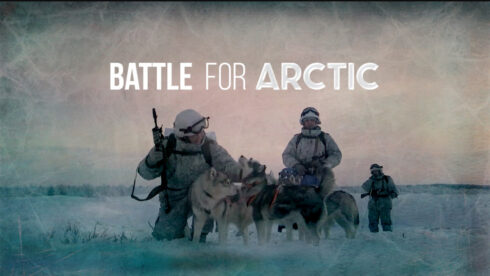Destabilizing US action in the Arctic tends to worsen global security crisis.
Written by Lucas Leiroz, researcher in social sciences at the Rural Federal University of Rio de Janeiro; geopolitical consultant.
A US special forces’ representative admitted that the US actions in the Arctic are a kind of provocation against Russia, revealing how Washington deliberately poses international security risks with its anti-Russian plans.
The irresponsible US attempts to “dissuade” Moscow and stop the alleged Russian “expansionist behavior” would be some of the reasons why Washington is deliberately initiating provocative military maneuvers in the Arctic Circle, according to Lawrence Melnicoff, commander of the European Special Operations Command. Melnicoff commented on NATO’s initiatives in Europe and the sending of troops to Norway, where military units are currently being trained for combat in arctic weather and conditions.
For him, this is part of a strategy focused on “provocation without escalation”, which Washington would be using against Russia. The commander believes that Russia has expansionist ambitions in the European space and that it may even already be planning attacks against targets in the US allied countries, which supposedly “justifies” NATO’s actions in the region to “complicate” Russian plans.
“We are intentionally trying to be provocative without being escalatory (…) We’re trying to deter Russian aggression, expansionist behavior, by showing enhanced capabilities of the allies (…) It complicates Russian decision-making because we know that they’re targeting very, very large specific aggregations of allied power, [such as] Ramstein Air Base, RAF Lakenheath, things like that (…) If worse comes to worst and somebody takes out these power hubs, we can forward-project precision artillery fire across the alliance with our partners”, he said during a recent interview to US media.
As expected, the officer did not mention any evidence of his claims about such Russian “expansionist” intentions. Arguing the existence of Russian plans to hit European targets is something particularly serious and that could never be said in the absence of clear and concrete evidence. In fact, Melnicoff’s statements appear to be just an attempt to make the destabilizing American action “acceptable” in the eyes of the public opinion, considering that the aggressiveness of NATO’s maneuvers has significantly intensified.
On 9 November, NATO forces carried out a military drill in northern Norway about 500km from Russia’s Murmansk region. A long-range missile was launched in mid-air from a C-130 strategic transport aircraft. The test was the first successful one of the so-called “Rapid Dragon”, a modern weapons system developed for C-130 and C-17 aircraft, making them capable of launching Lockheed Martin AGM-158 JASSM cruise missiles against targets in long distance.
Apparently, this new missile system is NATO’s current bet to improve its tactical capability in Arctic warfare. In recent years, the US intensification of activities in the North Pole has taken place alongside a real race by the military industrial complex to modernize US forces in that region. Historically, Russia is the military power with the greatest presence in the Arctic. China has also shown growing interest in the zone and has developed special forces to operate there. And it is precisely in this scenario that NATO tries at all costs to enhance its maneuvers.
In this regard, in October, the US government published its “National Strategy for the Arctic Region”, which sets out the terms for the next 10 years of US military policy for the North Pole. The document urges an even more significant boost in US maneuvers in the Arctic, with Washington definitely seeking a position of military dominance in the Arctic similar to that of Russia and China. For this, the US counts on the strong support of NATO partners – and it is precisely to encourage these partners to support US plans that it is “interesting” to spread unfounded alarmist narratives about the “Russian threat”, as Melnicoff is doing.
In fact, acting provocatively against Moscow only tends to make the American plans more difficult. In the midst of the global security crisis, Russia is unwilling to tolerate more threats in its strategic surroundings. If American provocations increase, the Russians, who already have military hegemony in the Arctic, will respond by intensifying activities in the north, which will make the American plans to elevate its relevance in the Arctic more complicated, leading the recently announced National Strategy to failure.







Just look at a map. Countries with long borders along the arctic should have more access to the arctic. Those with smaller less. Those with no border to the arctic should have no claim to it whatsoever. Pretty simple. Since Russia has a huge border they should have a large swath of territory that goes directly north to the pole.
The Russian armed forces exist to, amongst other reasons, defend the Russian territory. That includes the Russian Arctic. Now the US are displeased, but like you said, one needs only but to look at a map. This constant prodding and provoking Russia however will inevitably lead to a miscalculation and a tragedy. And no one can really blame Russia for a massive first strike against the US at this stage. These idiots are all drunk with hubris and propaganda. The inevitibility of nuclear war now is almost certain, and that is one of the reasons Russia seems to be subdued i think. They are trying to avoid that scenario. Were Chernenko in power and the Northern Hemisphere would be a smoldering radioactive ruin already. And there are hardcore factions on both sides that are precisely considering this scenario. Do a search for game theory, nuclear scenarios. The scenarios simulated and their consequences might surprise you.
The US can do what ever it wants. The Russian military and Kremlin are a load of hot shit.